Occasionally somebody ups and discusses the nature of our literary journalism and what sort of a creature the reviewer is. Dr. Bliss Perry was at this not long ago in the Yale Review. Editor for a couple of decades of our foremost literary journal, and now a professor in one of our great universities, Dr. Perry certainly knows a good deal about various branches of the book business. His highly critical review of the reviewing business has somewhat the character of a history that a great general might write of a war. A man who had served in the trenches, however, would give a more intimate picture, though of course it would not be as good history.
I will give an intimate picture of the American reviewer at work to-day: the absurdly young, the slightly bald, and the elderly with whiskers; and of his hard and picturesque trade.
There was an old man who had devoted a great many years to a close study of engraved gems. He embodied the result of his elaborate researches in a learned volume. I never had a gem of any kind in my life; at the time of which I write I did not have a job. A friend of mine, who was a professional reviewer, and at whose house I was stopping, brought home one day this book on engraved gems, and told me he had got it for me to review. “But,” I said, “I don’t know anything about engraved gems, and” (you see I was very inexperienced) “I can write only about things that particularly interest me.” “You are a devil of a journalist,” was my friend’s reply; “you’d better get to work on this right away. You studied art, didn’t you? I told the editor you knew all about art. And he has to have the article by Thursday.”
He instructed me in certain elementary principles of the art of successful reviewing; such, for example, as getting your information out of the book itself; and he cautioned me against employing too many quotation marks, as the editor did not like that.
My review, of a couple of columns, cut a bit here and there by the literary editor, appeared in a prominent New York paper. Speaking quite impartially, simply as now a trained judge of these things, I will say that it was a very fair review: it “gave the book,” as the term is. I discovered that I had something of a talent for this work; and so it was that I entered a profession which I have followed, with divers vicissitudes, for a number of years.
I became good friends with that literary editor, and began to contribute regularly week by week to his paper. He liked my style, and always gave me a good position in the paper. He liked me personally, and always put my name to my reviews; which was a thing against the rule of the paper—that being that only articles by celebrated persons were to be signed.




